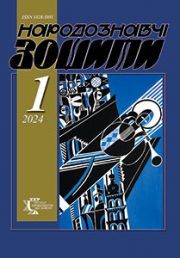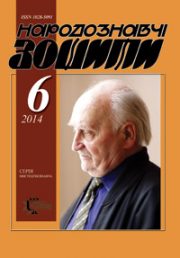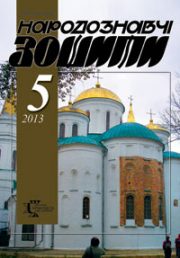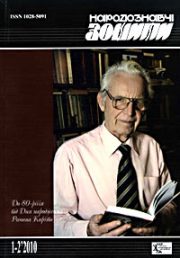The Ethnology Notebooks. 2025. № 2 (182), 388—396
UDK 94:[327.57/.58:314.15](44:430:4-672ЄС) “20”(09)
DOI https://doi.org/10.15407/nz2025.02.388
SYPKO Bogdana
- ORCID ID: https://orcid.org/0000-0002-3136-9340
- Candidate of History, docent,
- The Ivan Franko National University of Lviv,
- Department of Modern World History,
- 1, Universytetska str., 79000, Lviv, Ukraine,
- Contacts: е-mail: bogdanasypko@gmail.com
Abstract. Introduction. France and FRG have been postulating themselves as a kind of «engine of Europe». The leaders of two states, regardless of their political affiliation, were convinced that without a Franco-German consensus, the harmonious development of EU was impossible, so they tried to coordinate their positions on key issues.
Problem Statement. The challenge for the EU at the beginning of the 21st century was to coordinate migration policy. Therefore, the joint Franco-German declaration of January 22, 2003, included a clause stating that the parties sought common EU approaches to asylum and immigration.
Purpose is on the basis of official documents, statements by French officials, as well as materials from a special Franco-German seminar dedicated to developing common approaches to migration policy, held on March 27, 2008, to analyze how France relied on German support in the context of lobbying for the adoption of European Pact on Immigration and Asylum (2008).
Methods. The general scientific methods of analysis and synthesis, as well as special scientific comparative-historical and chronological methods are used in the work. The author adheres to the principle of historicism.
Results. The practical implementation of these statements was initiated by N. Sarkozy, who, in the context of scaling up French migration initiatives to the European level, relied on his German colleague W. Schäuble. Having become President, N. Sarkozy not only immediately created a specialized Ministry, but also on his first day in office paid a visit to Berlin to enlist Germany’s support for the previously prepared Pact. The preparation for the adoption of this document was carried out by Minister B. Hortefeux. At all stages, France was actively supported by Germany.
Conclusion. On October 16, 2008, the Heads of State and Government of the 27 EU Member States unanimously adop ted the European Pact on Immigration and Asylum, which included five key commitments: to organize legal immigration, to combat illegal migration, to strengthen the effectiveness of external border controls, to build a Europe of asylum, and to create a global partnership with countries of origin and transit. This was an extremely important political step, but it did not entail any specific legal obligations. Its shortcomings had already been demonstrated by the migration crisis of 2015—2016.
Keywords: European Union, immigration, integration, Germany, Brice Hortefeux, Nicolas Sarkozy, France.
Received 28.03.2025
REFERENCES
- Malynovs’ka, O. (2018). Migration Policy: Global Context and Ukrainian Realities. Kyiv: NISD [in Ukrainian].
- Kochubej, L. (2012). France: Contemporary Debates about National Identity. Scientific Notes Kuras Institute of Political and Ethnic Studies of the National Academy of Sciences of Ukraine, 1 (57), 58—69 [in Ukrainian].
- Shelemba, M. (2022). Sociocultural Aspects of Immigration in France. Political Priorities of Ukraine. Collection of Scientific Papers, 1 (28), 80—88 [in Ukrainian].
- Vovchuk, L., & Avdiushkina, I. (2021). French Policy in the Field of Resolving the Problem of Illegal Migration. Antiquities of Lukomorye, 5 (8), 165—172 [in Ukrainian].
- Dovbysh, M. (2019). Migration Crisis in the European Union Countries in the Context of Modern Migration Processes (in the example of the French migration model). European Political and Law Discourse (Vol. 6, issue 6, pp. 89—95) [in Ukrainian].
- Sl’ota, I. (2013). Shifts in French Government Immigration Policy at the turn of the 20th and 21st centuries. Scientific works of the Faculty of History of Zaporizhia National University (Vol. ХХХVI, pp. 286—291) [in Ukrainian].
- Guimard, Ph., & Beaud, St. (2023). Immigration Policies in France and Europe. Paris: IRES [in French].
- Rouet, G., & Oustinoff, M. (2018). France — Germany: Miscommunications and Convergences. Paris: SNRS Editions, DOI: 10.4000/books.editionscnrs.46287 [in French].
- (1963, January 22). Elysee Treaty. Retrieved from: https://france-allemagne.fr/fr/le-couple-franco-allemand/historique/traites/traite-de-lelysee-22-janvier-1963 (Last accessed: 25.03.2025) [in French].
- Scharping, R. (1994). Franco-German Cooperation Facing New Challenges. Foreign Policy, 2, 537—543, DOI: https://doi.org/10.3406/polit.1994.4289 [in French].
- Demesmay, C. (2018). A Difficult Convergence: Franco-German Cooperation During the Refugee Crisis. Annuaire francais des relations internationales (Vol. XIX, pp. 455—467) [in French].
- Press conference by Mr. Jacques Chirac, President of the Republic, on the results of the European Council, in particular on the fight against illegal immigration, the reform of the Council, France’s compliance with the Budgetary Stability Pact and the status of overseas territories, EU enlargement and the Middle East, Seville, June 22, 2002. Retrieved from: https://www.vie-publique.fr/discours/130833-conference-de-presse-de-m-jacques-chirac-president-de-la-republique-s (Last accessed: 25.03.2025) [in French].
- Joint Franco-German declaration on the occasion of the 40th anniversary of the Elysee Treaty (Paris, 22 January 2003). Retrieved from: https://france-allemagne.fr/fr/le-couple-franco-allemand/historique/traites/declaration-commune-franco-allemande-loccasion-du (Last accessed: 25.03.2025) [in French].
- Sypko, B. (2017). Muslim Community in the Life of the French Republic (1995—2007). Lviv: Ivan Franko National University of Lviv [in Ukrainian].
- Fabry, E. (2008). Defense, Immigration, Energy. Franco-German Perspectives on Three Priorities of the French EU Presidency. Reports of seminars organized in partnership with the Konrad Adenauer Foundation. Working document. October 2008.Paris: Fondation pour l’innovation politique [in French].
- Interview with Mr. Brice Hortefeux, Minister of Immigration, Integration, National Identity and Co-development, on La Chaine Info on September 11, 2007, on the objective of 25000 expulsions of undocumented immigrants in 2007, the construction of a European pact on illegal immigration and immigration policy. Retrieved from: https://www.vie-publique.fr/discours/167652-interview-de-m-brice-hortefeux-ministre-de-limmigration-de-lintegra (Last accessed: 25.03.2025) [in French].
- Zuinghedau, A. (2008). The European Pact Sacrifices Fundamental Rights. Plein droit, 79, 30—33, DOI: https://doi.org/10.3917/pld.079.0030 [in French].
- Statement by Mr. François Fillon, Prime Minister, on the fight against climate change, the European pact on immigration and asylum, and the stability and transparency of financial markets, Paris, February 5, 2008. Retrieved from: https://www.vie-publique.fr/discours/169579-declaration-de-m-francois-fillon-premier-ministre-sur-la-lutte-contre (Last accessed: 25.03.2025) [in French].
- Press conference by Mr. Brice Hortefeux, Minister of Immigration, Integration, National Identity and Inclusive Development, on the figures for immigration policy and the draft European Pact on Immigration and Asylum, Paris, June 19, 2008. Retrieved from: https://www.vie-publique.fr/discours/171366-conference-de-presse-de-m-brice-hortefeux-ministre-de-limmigration-d (Last accessed: 25.03.2025) [in French].
- Excerpts from the interview of Mr. Bernard Kouchner, Minister of Foreign and European Affairs, with the German radio station «Deutschlandradio» on May 4, 2008 in Berlin, on the revival of the European Union and the Franco-German engine, Turkey’s entry into the EU, the Union for the Mediterranean project, the priorities of the French presidency of the European Union, in particular the Pact on immigration, Tibet and China and the question of human rights. Retrieved from: https://www.vie-publique.fr/discours/170683-extraits-de-lentretien-de-m-bernard-kouchner-ministre-des-affaires-et (Last accessed: 25.03.2025) [in French].
- (2008, October 16). European Pact on Immigration and Asylum. Retrieved from: https://www.eur-lex.europa.eu/legal-content/FR/TXT (Last accessed: 25.03.2025) [in French].
- Statement by Mr. Brice Hortefeux, Minister of Immigration, Integration, National Identity and Inclusive Development, on the draft European Pact on Immigration and Asylum, Paris, September 8, 2008. Retrieved from: https://www.vie-publique.fr/discours/172177-declaration-de-m-brice-hortefeux-ministre-de-limmigration-de-linteg (Last accessed: 25.03.2025) [in French].
- Interview with Michèle Alliot-Marie, Minister of the Interior, Rachida Dati, Minister of Justice, and Mr. Brice Hortefeux, Minister of Immigration, on Europe 1 on July 8, 2008, on the proposed «European Pact on Immigration and Asylum» and the European harmonization of justice and security issues. Retrieved from: https://www.vie-publique.fr/discours/171815-interview-de-mmes-michele-alliot-marie-ministre-de-linterieur-rachida (Last accessed: 25.03.2025) [in French].
- Statement by Mr. Brice Hortefeux, Minister of Immigration, Integration, National Identity and Inclusive Development, on immigration policy and the European Pact on Immigration and Asylum, Paris, August 28, 2008. Retrieved from: https://www.vie-publique.fr/discours/172021-brice-hortefeux-28082008-pacte-europeen-sur-l-immigration-et-l-asile (Last accessed: 25.03.2025) [in French].
- Statement by Mr. Christian Poncelet, President of the Senate, on the role of national parliaments alongside the European Parliament in implementing the Pact on Immigration and Asylum, Brussels, 10 September 2008. Retrieved from: https://www.vie-publique.fr/discours/172199-declaration-de-m-christian-poncelet-president-du-senat-sur-le-role-de (Last accessed: 25.03.2025) [in French].
- The European Pact on Immigration and Asylum. Paris: Ministere de l’immigration, de l’integration, de l’identite nationale et du developppement solidaire, 2008 [in French].
- Statement by Mr. Eric Besson, Minister of Immigration, Integration, National Identity and Inclusive Development, in response to a question on the signing of the Pact on Immigration and Asylum by all European governments, at the National Assembly on May 26, 2009. Retrieved from: https://www.vie-publique.fr/discours/175416-declaration-de-m-eric-besson-ministre-de-limmigration-de-lintegrati (Last accessed: 25.03.2025) [in French].
- Statement by Mr. Eric Besson, Minister of Immigration, Integration, National Identity and Inclusive Development, in response to a question on the European Pact on Immigration and Asylum, at the National Assembly on June 3, 2009. Retrieved from: https://www.vie-publique.fr/discours/175529-declaration-de-m-eric-besson-ministre-de-limmigration-de-lintegrati (Last accessed: 25.03.2025) [in French].







